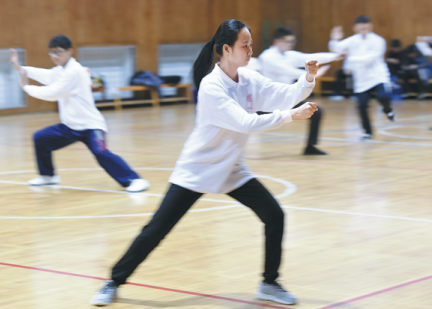 |
|
More than 140 students from Peking University take part in a tai chi competition at the campus in Beijing on Dec 23. [PHOTO BY WEI XIAOHAO/CHINA DAILY] |
The Healthy China 2030 blueprint released by the Central Committee of the Communist Party of China and the State Council in 2016 also supports the promotion of tai chi and other traditional martial arts to improve public health.
Some students say it's more.
Peking University PhD student Lai Zhuoyuan began practicing traditional Chinese martial arts in middle school. He started comprehensively studying tai chi and other Chinese martial arts, including bagua zhang (the Eight-Trigram Palm), in his freshman year.
Lai practices martial arts at least twice a week.
It's energizing yet relaxing, he says.
And it helps him improve his technique.
"Tai chi requires core muscles to exert force. That's a fundamental kung fu skill, too," the 24-year-old biochemistry major says.
"It helps me to progress in martial arts."
Peking University's PE director Li Ning says tai chi isn't just physical exercise. It's also philosophical and possesses connotations of traditional Chinese civilization.
The university has perpetuated traditional culture since its founding in 1898, Li points out. Many of its social science subjects rank highly, both nationally and internationally.
"Tai chi is embedded in our culture," Li says.
Taking Wang's tai chi class has taught sophomore Zhang Wenjun a lot about ancient culture, ranging from medicine to philosophy. And it has also helped him to find peace this semester.